专门用途英语汇报
用英语工作汇报范文

用英语工作汇报范文English: This week, I focused on the completion of the marketing campaign for our new product launch. I worked closely with the marketing team to refine the messaging and design of the campaign materials, ensuring consistency with our brand image and target audience. I also conducted market research to identify key trends and consumer preferences that would inform our strategy. In addition, I collaborated with the sales team to align our marketing efforts with their goals and ensure a seamless customer experience. Overall, I am confident that the campaign will effectively showcase the value proposition of our new product and generate interest among our target market.中文翻译: 本周,我专注于完成我们新产品发布的营销活动。
我与营销团队密切合作,完善活动材料的信息和设计,并确保与我们的品牌形象和目标受众一致。
我还开展了市场研究,以确定能够指导我们策略的关键趋势和消费者偏好。
此外,我与销售团队合作,以使我们的营销工作与他们的目标保持一致,确保顾客体验流畅。
专门用途英语课程系列大学学术英语视听说教程上(终审稿)

专门用途英语课程系列大学学术英语视听说教程上公司内部档案编码:[OPPTR-OPPT28-OPPTL98-OPPNN08]专门用途英语课程系列:大学学术英语视听说教程上Unit 1 Belonging to a GroupChapter 1The Marriage, Family, and the HomeReading and thinking about the topicB. Answer the questions1、Increased industrialization, greater geographical mobility, higher divorce rates and greater equality for women are among the changes that have affected family structure over the past century.2、In the extended family, many generations live in the same household. In the nuclear family, two married adults live together with their children3、Alternative family structures include single-parent families, couples living together without getting married, divorced couples who remarry, and blended families.Listening for factual informationA. Fill in the chart1、Egypt2、Niger3、South Africa4、Argentina5、Canada6、the United States7、China8、Japan9、France10、SpainB. Listen and fill in the chart18 29 27 27 31 18 16 34 35 27 32 30 34 33 Interview 1 -The Stress of Teaching First-Graders Examining vocabulary in context:1、compared to most people2、food prepared at home3、stop fighting4、hardly5、customs6、origins7、protection, a place to live8、competition between brothers and sisters9、telling others what to do10、give up and cooperateListening for details:1、C2、B3、B4、C5、B6、B7、C8、AInterview 2- Family StoriesExamining vocabulary in context:1、entertained, kept her from paying attention to something2、laughing in an uncontrolled way3、defrost4、really funny5、object that belongs to the family6、distinctive, different7、worth a lot of money8、an object that remains in the family for many years9、a family member with a bad reputationResponding to questions:1、Thanksgivinga big dinner2、plastic packaging3、make them throw the turkey out4、froze5、a bow6、unique and beautifula baby7、pass it on to her children in the future8、uncle9、had a big disagreement with them Listening for stressed words:Expert 1ACExpert 2ACExpert 3BCExpert 4ACExpert 5BCBefore the LectureMain ideas and supporting details:1.22.13.14.25.2Lecture Part 1-Lecture Part 1 Rewards and Punishments Guessing vocabulary from context:1-5: iacjf6-10: gdbheOrganizing your notes in columns:Main Idea 1·family – the most basic unit of social structure ·how families are changing·nontraditional families: good or bad effect on children Main Idea 2·punishmentsMain Idea 3·eat vegetables – then ice cream·Children get gifts for good behavior.Main Idea 4·second important way in which children are socialized ·Parents don’t let children watch TV if they get bad grades. Main Idea 5·Hitting on hand/spanking doesn’t teach children anything. Lecture Part 2 -ModelingGuessing vocabulary from context:1、f2、d3、e4、b5、a6、g7、cOrganizing your notes in columns:Main Idea 6·learning to behave by following an exampleMain Idea 7·First role models are often parents·Peter likes to study because his mother studies with him. Main Idea 8·do as I tell you·Studies: If you smoke, probably ineffective to tell a child not to smoke.Main Idea 9·family members, friendsMain Idea 10·from TV: 80% of programs contain violent behaviorMain Idea 11·grow up in environment with fair rules that are followed Chapter 2The Power of the GroupReading and thinking about the topicB. Answer the questions:1、People can belong to different groups: families, friends, groups at work, at school, and in religious settings, and societies and nations.2、Peer pressure is pressure put on others of the same age or in the same situation.3、The groups we belong to may influence our opinions, interactions, and decisions.Getting StartedListening for specific information/B:1、wouldwould not2、wouldwould3、wouldwould not4、would notwould not5、wouldwould notBefore the InterviewsBefore the Interviews:a、go along with the crowdb、jumping on the bandwagonc、Two heads are better than one.d、there’s no “I” in teame、Don’t be a backseat driver.f、you’re all in the same boat Interview 1 -Living with Teenagers Examining vocabulary in context:1、move or change2、becomes fully developed3、with a quick look4、a new fashion that is suddenly popular5、watch it carefully6、place a limit on what is permitted7、intimidated, frightened by others8、groups of friends with shared interests9、people who copy others’ behaviorListening for main ideas:23478Interview 2- Expressions about GroupsExamining vocabulary in context:1、student studying for an advanced degree, like an MA2、stress, focus on the importance of3、a person specializing in languages4、people who are similar do similar things together5、spend time with6、acting in the same way as other people7、large numbers of people went to the concert8、suggestsListening for specific information:1、A2、B3、B4、A5、A6、B7、BListening for tone of voice:1、joking2、serious3、joking4、serious5、jokingBefore the LectureOrganizational phrases:a、7b、2c、4d、1e、8f、3g、5h、6Lecture Part 1 -Reasons for Culture Shock Guessing vocabulary from context:1、surroundings2、articulated3、immense4、stressful5、complex6、irrationally7、govern8、manifestation9、phenomenonOrganizing your notes in outline form:II:1、Reasons why people experience culture shock2、Different stages of culture shockIII:B、governed by other rulesC:1、irrationally2、shocked and out of controlLecture Part 2- Stages of Culture Shock Guessing vocabulary from context:1、d2、h3、a4、g5、c6、i7、f8、e9、bUsing a lecturer’s diagrams and charts: Stage 1HoneymoonEmotions:euphoriaexcitementStage 2LetdownEmotions:lonelinessconfusionStage 3ResignationEmotions:adjustmentUnit 1 Academic Vocabulary Review Academic Vocabulary Review:1、acquireacquired2、alternativeAlternatively3、benefitsbeneficial4、clarifiedclarificationclarify5、concentrationconcentrate6、conflictconflicting7、Conformingconform8、consequenceConsequently9、controversycontroversial10、cooperatescooperativeCooperation11、distinctdistinctions12、emphaticemphasized13、generationalgeneration14、interactiveinteract15、reactreactionUnit 2Unit 2 Gender in SocietyChapter 3Gender RolesReading and thinking about the topic B. Answer the questions:1、Gender roles are the socially learned patterns of behavior that distinguish boys from girls and men from women.2、The “nature/nurture”debate is about whether people’s behavior is inherited (innate) or learned (acquired).3、Boys and girls in many countries have more freedom today than in the past to explore their individuality, and less pressure to conform to traditional gender roles.Getting StartedBuilding background knowledge:1、independent, strong-willed, adventurous, athleticgreat2、timid, sensitivegoodchildrenboys3、gentle, sweet, helpless, vulnerable.aggressive, bad, brave, strongstereotypesInterview 1 -Bringing Up ChildrenExamining vocabulary in context:1、bring up2、period of time3、vaccination4、made to experience5、important problem6、do extremely well7、feeling of closeness and friendship8、make fun of / in a rough way Answering multiple-choice questions:1、C2、B3、C4、A5、C6、A7、B8、AInterview 2-Growing Up as a Boy or Girl Examining vocabulary in context:1、brothers and sisters2、deadline for returning home3、protect, sometimes too much4、emotionally encouraging5、felt unhappy and angry6、without raising any objections7、take care of, protect from danger Listening for specific information:Joy:2DifferentlySharon:0Not applicableDavid:1The samePeter:1DifferentlyListening for opinions:1.22.13.3B1.32.13.24.3Before the LectureBuilding background knowledge:1、Coeducational refers to boys and girls being taught in the same classroom, as opposed to single-sex (also called single-gender) education.2、According to the passage, boys often get more attention from teachers and are given more demanding academic challenges than girls in coeducational schools. In contrast, girls are encouraged to be quiet and well behaved.Using symbols and abbreviations/A:1-5: cjlia6-10: mkfnb11-14: dgheLecture Part 1- Pros and Cons of Single-Gender Education for GirlsGuessing vocabulary from context:1、g2、a3、f4、h5、b6、d7、e8、i9、cUsing symbols and abbreviations:Cons:·♂/♀ can’t dev. ability to interact/be comfortable/compete ·no smooth transition into adult ♂/♀ worldPros:·values ♀’s unique quals.·♂/♀ can’t dev. ability to interact/be comfortable/compete Lecture Part 2 -Two Main Benefits of All-Girls’ Schools Guessing vocabulary from context:(1)distractions(2)confident(3)collaborative(4)self-esteem(5)respect(6)emotionally(7)abstract(8)support(9)clarificationUsing your notes to make an outline:I:A:abstract thinking 4 yrs. earlier than boysC:collaborative learning activitiesII:B:collaborative learning activitiesIII:A:have been doing well in schoolC:become more confident and make positive changesChapter 4Gender Issues TodayReading and thinking about the topicB. Answer the questions:1、The women’s movement began in the eighteenth century.2、In the twentieth century, people began to be encouraged to choose careers they were interested in. At home, husbands and wives began to share household chores more.3、Not all women have benefited from this progress.Getting StartedListening for specific information:Situations:1、work harderhave a baby and leave her job2、loves his familyis more interested in her husband and children than sheis in her career3、discussing something importantjust chatting4、think the trip will be good for his careerwonder what her husband will thinkBefore the InterviewsBuilding background knowledgea、Mommy trackb、Old boys’ clubc、Level playing fieldd、Glass escalatore、Glass ceilingf、Sticky floorg、To get a foot in the doorInterview 1 -Gender Discrimination in the Workplace Examining vocabulary in context:1、deep and immediate2、terrible, bad3、feelings that are in conflict with each other4、finding reasons not to feel bad about myself5、usuallyAnswering multiple-choice questions:2、B3、C4、BInterview 2- Gender Inequality at Home and in the Workplace Examining vocabulary in context:1、difference in pay2、not very large or important3、co-workers4、chief executive officer —one of the most important positions in a company5、a feeling that they deserve the best opportunities6、legal responsibility for a child7、feel that they can do it even though they haven’t done it before8、a group of mothers and/or fathers that meets so that their children can play together9、a parent who is physically involved in caring for his or her childrenAnswering true/false questions:1、F2、F4、F5、F6、T7、TListening for tone of voice:1、A2、B3、B4、B5、CBefore the LectureBuilding background knowledge:1、A gender-specific term can show sexism. Chairman is one example.2、A gender-neutral term avoids sexism. Chair and chairperson are examples.3、It is difficult to be gender-neutral when using pronouns because there is no gender-neutral singular pronoun in English.4、The pronouns imply that the doctor, secretary and shopper are all male.Using telegraphic language:b、4c、1d、2Lecture Part 1-Gender-Specific and Gender-Neutral Language Guessing vocabulary from context:1、B2、A3、B4、B5、C6、C7、B8、AUsing telegraphic language:I:Sexism in lang. & how to avoid itII:Terms that refer to menIII:Gen-neutralIV:Grammar — problemMany univ. profs/writers prob do sameLecture Part 2-Questions and AnswersGuessing vocabulary from context:2、f3、e4、c5、b6、g7、dUsing telegraphic language:1、international organizationswordsideaschildren’s literaturewomen2、doeschairmanmenauthority3、more and morelanguagegender issuesUnit 2 Academic Vocabulary ReviewAcademic Vocabulary Review: 1、inaccurateAccuracy2、adjustingadjustment3、adulthood4、availabilityunavailable5、unawareawareness6、bondingbond7、challengechallenging8、communication9、discriminationdiscriminate10、expertise11、individualindividualistic12、intelligenceunintelligent13、similarsimilarities14、Traditionallytraditional15、InvisibleUnit 3 Media and SocietyChapter 5Mass Media TodayReading and thinking about the topicB. Answer the questions:1、The modern world is connected by all kinds of media, such as the radio, television, newspapers, and the Internet.2、It communicates information, entertains us, explains, informs, describes, and educates us.3、Some people believe that information is not always accurate. It may also be biased or incomplete.Getting StartedListening for specific information:1、A2、B3、A4、B5、AInterview 1 -Problems with TV NewsExamining vocabulary in context:1、watching TV2、medical surgery to improve your physical appearance/famous people3、trick, play with4、without serious meaning5、speaking “off-camera” about what the viewer is watching6、immediate satisfaction7、reporting8、tricked into watchingAnswering multiple-choice questions:1、C2、B3、A4、B5、B6、C7、BInterview 2- Opinions About the NewsExamining vocabulary in context:1、natural catastrophe, serious problem2、surrounded against our wishes3、the latest information4、really believe5、after it happens6、photographers who take pictures of celebrities7、unwelcome attention into private matters Listening for main ideas:1、BC2、AB3、B4、ABListening for stressed words:1、A2、B3、B4、CBefore the LectureListening for signal words:OccasionallyTo begin withActuallyThese daysButGenerally1、Nowadays2、In fact3、First of all4、Sometimes5、Usually6、HoweverLecture Part 1- The Work of a Journalist Guessing vocabulary from context:1、c2、b3、d4、i5、e6、g7、f8、h9、aLecture Part 2 -Getting a Story into Print Guessing vocabulary from context:1、b2、e3、a4、d5、c6、fChapter 6Impact of the Media on Our LivesReading and thinking about the topicB. Answer the questions:1、People disagree about the effects of the media on society.2、The media allows us to interact with others, participate in world events, connect with friends and strangers, and keep informed. However, not everyone has equal access to the Internet. The media also invades our privacy and may make us passive, violent, or materialistic. They also cause us to waste time.Getting StartedRecording numerical information:Interview 1 -The Advantages of the MediaExamining vocabulary in context:1、firmly established2、area/entered3、grown in importance4、critically important5、feeling of affection for the past6、biased, inaccurate7、traditions, beliefs and valuesListening for specific information:1、islittlemedia2、conveniencesending a lettersending an email3、photos and videos4、don’t exist5、luckyhasInterview 2-Disadvantages of the MediaExamining vocabulary in context:1、forced to accept different views, not allowed to think for ourselves2、prevents us from using well3、available to you4、disadvantages5、communicate6、with a high level of industrial development / with a low level of industrial development7、uniform, the same for everyoneListening for specific information:1、antisocialreading2、cell phoneinternational communication3、the developing worldthe United StatesListening for tone of voice:1、B2、C3、A4、BBefore the LectureOrganizing your notes as a map:Lecture Part 1 -Violence, Passivity, and AddictionGuessing vocabulary from context:2、a3、b4、e5、c6、f7、h8、dOrganizing your notes as a map:1、susceptible to violenceboy jumped out of window like superhero on TV2、we may make bad decisions because we can’t tell dff. btwn. fantasy & reality3、time wasted on Internet always checking e-mailLecture Part 2-Advertising and Invasion of PrivacyGuessing vocabulary from context:1、a2、f3、d4、h5、b6、g8、eUnit 3 Academic Vocabulary Review Academic Vocabulary Review:1、V,N2、N3、V4、N5、N,V6、V7、A8、N,A9、A10、N11、A12、V13、V14、V,A15、N16、N1. Celebrity wedding plans revealed Accessrestrictedselectedrequired2. Cholesterol levels risingConsumersperspectiveoverallrelevant3. New smartphone releasedSurveysInnovationmanipulatedobjective4. Bees disappearing across the globe issuetheoriesnegativecontradictingUnit 4Unit 4 Breaking the RulesChapter 7Crime and CriminalsReading and thinking about the topicB. Answer the questions:1、Deviant behavior is unacceptable to society, but not all deviant behaviors are criminal. A crime is an illegal deviant behavior.2、Two main categories of crime are felonies and misdemeanors. Other crime categories include white-collar crimes, blue-collar crimes, “crimes of passion,”and “modern”crimes that have been made possible by technology, such as cyber crime.3、It is difficult to know how many crimes are committed because not all crimes are reported and not all criminals are caught.Getting StartedBuilding background knowledge:5 167 3 4 2Interview 1 -Crime in Society TodayExamining vocabulary in context:1、personally affected2、walking around with no clear purpose3、noisy, wild4、even less, certainly haven’t5、without any definite pattern6、small metal object fired from a gun7、situation that will lead to serious trouble8、groups of young people who are involved in antisocial or illegal activities9、lazy, not interestedAnswering true/false questions:1、T2、F3、F4、F5、T6、F7、F8、TInterview 2-Being the Victim of a CrimeExamining vocabulary in context:1、attacked and robbed2、being charged with a crime and taken to court3、easily influenced4、strong and manly5、broken into, searched, and left in a messy condition6、something you can never get again7、invasion8、thieves who steal things out of pockets or bags, especially in crowds9、emotionalListening for details:1、A2、AB3、BC4、B5、ABC6、BC7、AB8、A9、BCListening for tone of voice:serious, thankfulthoughtful, surprisedsad,angryangry, resignedBefore the LectureOrganizing vocabulary: Technical terms:Categories of crime:misdemeanorwhite-collar crimeblue-collar crimeTypes of crime:fare evasionpickpocketingkidnappingMethods of solving crime:crime hotlinefingerprintingpsychological profilingPeople who commit crime or are involved in punishing crime: juryDefendantClarifying your notes:misdemeanors15judgeLecture Part 1-Types of CrimeGuessing vocabulary from context:1、h2、g3、b4、f5、e6、d7、a8、cLecture Part 2 -Ways of Solving Crime Guessing vocabulary from context:1、A2、C3、B4、C5、A6、C7、CUsing your notes to answer test questions: 1、questioningestablish many basic facts2、adraidpubliclya family member3、unique4、the waypersonality and motivation5、privacy6、99%Chapter 8Controlling CrimeReading and thinking about the topicB. Answer the questions:1、One approach is to stop crime from happening in the first place; another is to punish it more harshly.2、Educational and social programs could discourage young people from committing crimes.Getting StartedListening for opinions:1、A2、B3、A4、B5、A6、BInterview 1 -Preventing Juvenile CrimeExamining vocabulary in context:1、makes worse2、machines that can detect guns, knives, and other weapons made of metal3、physically examined4、with one other person5、become ineffective6、organized7、money8、stronger, more serious9、punishmentListening for main ideas:1、mediaschool system2、security guardsentrancessearched3、don’tjailwrong4、security guards5、instructionalathletic6、doesbetterInterview 2- The Prison ExperienceExamining vocabulary in context:1、people who commit a crime for the first time2、stopping people from committing crime3、taught how to have a socially acceptable way of life4、most important people5、cruel and severe6、programs that help released prisoners adjust to society7、repeat criminals8、disrespectful, critical9、shameListening for main ideas:While a convicted criminal is in prisonrehabilitationeducationaldrug treatmentpsychologicalcutAfter a person is released from prisonBridge programshousing and jobsvery viewListening for contrasting ideas:1、A2、B3、B4、BBefore the LectureRecording numerical information:1、19722、19763、over a thousand4、675、2/36、97、0.58、1.1Lecture Part 1-Arguments Against the Death Penalty Guessing vocabulary from context:1、A2、B3、B4、C5、B6、C7、C8、CLecture Part 2-Questions, Answers, and Comments Guessing vocabulary from context:1、g2、e3、h4、b5、c6、d7、f8、aAfter the LectureSummarizing what you have heard:controversialdeterhomicidepoor malesAfrican Americansmake mistakesto be punished50,000 executionsUnit 4 Academic Vocabulary Review Academic Vocabulary Review1-5: hgfeb6-10: dcalm11-15: konij1、investigateddemonstratecommitting2、accuratesecurityrandomoccur3、statisticsidentifiedpositiveeliminate4、detectiveillegalmotiveresearch。
专门用途英语及其翻译教学

专门用途英语及其翻译教学随着全球化的加速和区域经济一体化的不断深入,各行各业对于专业性语言能力的要求也越来越高。
专门用途英语(ESP)便应运而生,在提高语言能力和解决实际问题方面起到了重要的作用。
专门用途英语的翻译教学则是在这一基础上进行的进一步探索和实践。
一、什么是专门用途英语专门用途英语是指特定领域或特定人群使用的英语语言,如商务英语、医学英语、法律英语等。
这些领域所涉及的语言和术语非常独特,与普通英语有很大差异,因此需要专门的语言技能和知识储备。
专门用途英语包含有固定的语言结构、术语和表达方式,能够使使用者更容易掌握领域知识并与行业内人士进行交流和沟通。
二、专门用途英语的翻译教学专门用途英语翻译教学是在传授专业化英语基础的基础上,进一步教授专业性术语和表达方式的翻译技巧。
这种教学方法强调实际应用性,注重教学内容的实用性和可操作性,帮助学生掌握更多的专业术语和表达方式。
通过专门用途英语的翻译教学,学生可以更好地运用专业术语和表达方式,更好地理解和应用英语所涉及的各种专业知识。
三、专门用途英语翻译教学的主要内容专门用途英语翻译教学主要包括以下内容:1、基础英语语言教学:包括词汇、语法、发音等方面的讲解和练习,使学生理解常用词汇和语言结构。
2、专业知识讲解:讲解不同领域的专业知识、概念和术语,帮助学生了解相关行业或学科的知识和技能。
3、翻译技巧培训:涵盖了翻译流程、翻译策略、翻译技巧、术语翻译等方面的内容,帮助学生掌握通用的翻译技能和方法,以及处理专业术语的技能。
4、实践学习:通过阅读真实样本、认证文件、翻译项目等,帮助学生学习更丰富、更实用的术语和表达方式,提高专业识别和解决问题的能力。
四、专门用途英语翻译教学的作用1、提高学习者的英语功底:通过专门用途英语翻译教学,学生可以更好地掌握基础英语知识和专业术语。
2、帮助学生理解和应用专业知识:在理解和运用英语的同时更深入地了解专业技能和知识。
3、提高学生的翻译能力:通过磨炼翻译技巧、培养工作态度和认识,学生的翻译实力得到提升。
专门用途英语研究发展综述
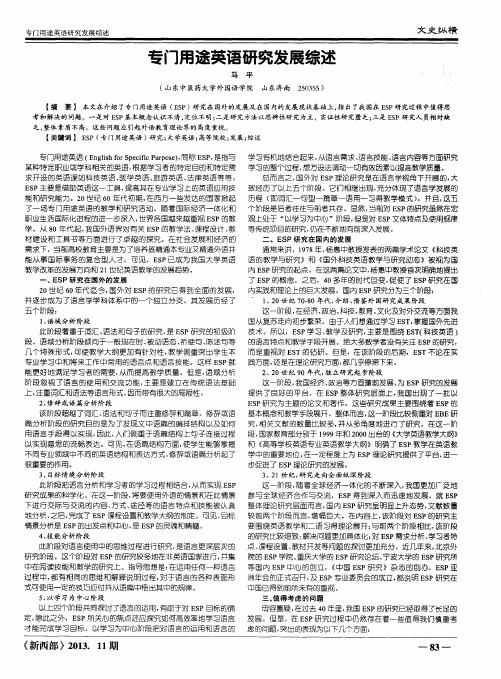
了一 场 专 门用 途 英语 的教 学和 研 究 活动 。随着 国际经 济 一体 化 和 职业 生活 国际化 进程 的进一 步深入 , 世界 各 国越 来越 重视 E S P的 教 学 。从 8 O年代 起 , 我 国外 语 界对 有关 E S P的教 学法 、 课程 设计 、 教 材建 设 和 工具 书 等方 面进 行 了卓 越 的探 究 。在 社 会发 展 和经 济 的 需求 下 , 当 前高校 教育主 要是为 了培养 既精通 本专业 又精通 外语 并 能从 事 国 际事 务 的复 合 型人 才 。可 见 ,E S P已 成 为我 国大 学 英语 教学 改革的 发展方 向和 2 1 世纪 英语教 学的发 展趋势 。
语 的教 学与 研究 》 和 《 国外 科技 英语 教 学与 研 究动 态 》被视 为 国 内E S P研究 的起点 。在这 两篇论文 中 , 杨惠中 教授首 次明确 地提 出
了E S P的概 念 。之 后 ,4 0多 年的 时代 巨变 , 促使了 E S P研究 在 国 2 0世 纪 6 0年代 迄 今 , 国 外对 E S P的研 究 已得 到 全 面 的发 展 , 内实践 和理论 上的 巨大发展 。国 内 E S P研究 分为三个 阶段 : 并逐 步成 为 了语 言 学学 科 体 系中 的一 个独 立 分支 。其 发展 历 经 了 1 、2 0世 纪 7 O _ 8 0年代 , 介 绍、 借鉴 外 国研 究成果 阶段 五个 阶段 : 这 一阶段 , 在 经济 、 政治 、 科技 、 教 育、 文化 及对 外交 流等方 面 我 1 、 语域 分析 阶段 国从复 苏 走向初 步繁 荣 。由于人 们想 通过学 习 E S T , 掌握 国外 先进 此 阶段 着重 于词 汇 、 语法 和 句子 的研 究 , 是E S P研 究 的初 级阶 技 术 。所 以 ,E S P学 习 、 教学 及研 究 , 主要 是 围绕 E S T ( 科技 英语 ) 段 。语 域 分析 阶段倾 向于 一般现 在 时 、 被 动语 态 、 祈 使句 、 陈述 句等 的语言 特点 和教学 手段开 展 。绝 大多 数学者 没有关 注 E S P的研究 , 几个 特 殊形 式 , 可使 教 学大 纲 更加 有针 对 性 , 教 学 侧重 突 出学 生本 而是 重视 对 E S T的钻 研 。但 是 , 在 该 阶段 的后 期 ,E S T不 论 在 实 专业 学 习中 和将 来工 作 中常 用的 语言 点和 语 言技 能 。这 样 E S P就 践 方面 , 还是在 理论研 究万面 , 都几 乎停滞下 来 。 能更 好 地满 足学 习 者 的需 要 , 从而 提高 教 学质 量 。但是 , 语 域分 析 2 、2 0世 纪 9 0年代 , 独立研 究起 步阶段 阶段 忽 视 了语 言的 使 用 和 交流 功 能 , 主 要是 建 立 在传 统 语 法基 础 这一 阶段 , 我 国经 济 、 政 治等方 面蓬勃 发展 , 为E S P研究 的发展 上, 注重 词汇 和语法 等语言 形式 , 因而带 有很大 的局 限性 。 提供 了 良好 的平 台 。在 E S P整体 研 究 层 面上 , 我 国 出现 了 一批 以 2 、 修 辞或语 篇 分析阶段 E S P研 究 为主题 的论 文 和著 作 。这 些 研究 成果 主要 围 绕着 E S P的 该 阶段 超越 了词 汇 、 语 法和 句子 而注 重修 辞和篇 章 。修辞 或语 基 本概 念和教 学手段 展开 。整体 而言 , 这一 阶段比较侧 重对 E B E研 篇 分 析 阶段 的研 究 目 的是 为了发 现 文 中语 篇的 编 排结 构 以及如 何 究 , 相 关 文献 的 数量 比较 多 , 并从 多 角度 地进 行 了研 究 。在 这 一 阶 用语 言 手段 得 以实现 , 因此 , 人们 侧 重于 语 篇结 构 上句 子连 接过 程 段 , 国 家教育部 分别于 1 9 9 9年和 2 0 0 0出台的 《 大学英 语教学 大纲 》 以实 现意 思 的流 畅 表达 。可 见 , 在语 篇 结构 方 面 , 使 学 生能 够掌 握 和 《 高 等学 校 英语 专业 英语 教学 大纲 》 明确 了 E S P教学 在英语 教 不 同 专业领 域 中不 同的英语 结构 和表 达 方式 , 修 辞 或语篇 分析 起 了 学 中 的重 要地 位 , 在 一 定程度 上 为 E S P理论 研 究提供 了平台 , 进一 很重要 的作用 。 步 促进 了 E S P 理论 研究 的发展 。
专门用途英语研究综述

专门用途英语研究综述本文旨在探讨专门用途英语(ESP)教学法在海事英语学习中的应用及其研究方法。
我们将简要介绍专门用途英语和海事英语的相关概念和研究背景。
接着,我们将阐述专门用途英语教学法理论基础,并在此基础上深入探讨海事英语教学法。
我们将分享本文采用的研究方法及总结研究结果,并提出未来研究方向。
专门用途英语是指针对特定职业或领域而设计的英语课程,旨在提高学生的职业英语能力和交际能力。
海事英语作为专门用途英语的一个分支,主要涉及航海、船舶、港口等领域的英语应用。
随着全球海事产业的不断发展,海事英语教学法及其研究逐渐受到广泛。
专门用途英语教学法主要基于语言学习理论和认知心理学。
它强调将语言学习与学科知识相结合,通过真实语境中的实践活动,提高学生的语言应用能力和自主学习能力。
在海事英语教学中,专门用途英语教学法具有以下优势:紧密结合海事行业需求,提高学习者的职业英语能力;通过海事案例分析和实践活动,促进学习者积极参与到英语学习中;有利于培养学习者的跨文化交流能力和团队协作精神。
海事英语教学法注重培养学生的听说读写技能和口语交际能力。
以下是其主要特点及应用实践:听说读写技能训练:通过听力训练、口语交流、阅读理解和写作练习,全面提高学生的海事英语应用能力。
例如,针对船舶操作、航海图解读等海事场景进行模拟对话,锻炼学习者的听说能力。
口语交际能力培养:海事英语教学法强调实际交际能力的培养,通过组织角色扮演、案例讨论等活动,让学生在模拟真实的语境中学习和运用英语。
还可以邀请行业内专家进行讲座或分享经验,提高学生与海事领域相关的英语沟通能力。
跨文化交流能力训练:海事英语教学法跨文化交流能力的培养,通过介绍不同国家的海事法规、航海文化等知识,让学生了解并尊重各国间的文化差异。
同时,开展国际合作项目或组织学生参与国际交流活动,有助于提高学习者的跨文化意识和沟通能力。
本文采用文献综述、案例分析和问卷调查等方法,对海事英语教学法在实践中的应用效果进行了深入研究。
专门用途英语ESP在高职英语教改中应用论文
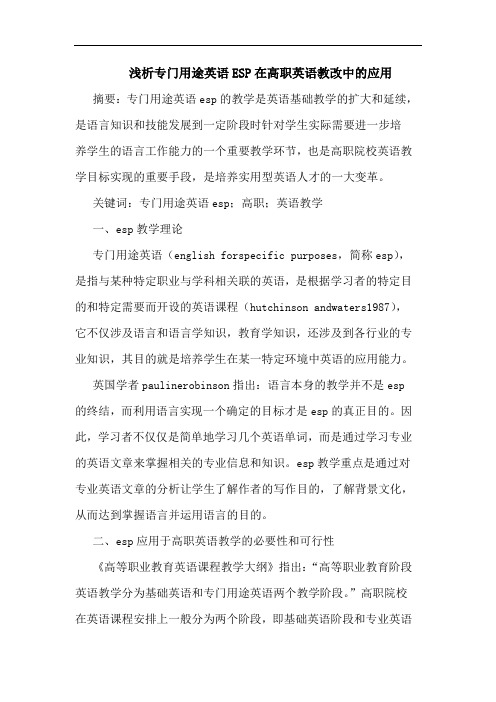
浅析专门用途英语ESP在高职英语教改中的应用摘要:专门用途英语esp的教学是英语基础教学的扩大和延续,是语言知识和技能发展到一定阶段时针对学生实际需要进一步培养学生的语言工作能力的一个重要教学环节,也是高职院校英语教学目标实现的重要手段,是培养实用型英语人才的一大变革。
关键词:专门用途英语esp;高职;英语教学一、esp教学理论专门用途英语(english forspecific purposes,简称esp),是指与某种特定职业与学科相关联的英语,是根据学习者的特定目的和特定需要而开设的英语课程(hutchinson andwaters1987),它不仅涉及语言和语言学知识,教育学知识,还涉及到各行业的专业知识,其目的就是培养学生在某一特定环境中英语的应用能力。
英国学者paulinerobinson指出:语言本身的教学并不是esp的终结,而利用语言实现一个确定的目标才是esp的真正目的。
因此,学习者不仅仅是简单地学习几个英语单词,而是通过学习专业的英语文章来掌握相关的专业信息和知识。
esp教学重点是通过对专业英语文章的分析让学生了解作者的写作目的,了解背景文化,从而达到掌握语言并运用语言的目的。
二、esp应用于高职英语教学的必要性和可行性《高等职业教育英语课程教学大纲》指出:“高等职业教育阶段英语教学分为基础英语和专门用途英语两个教学阶段。
”高职院校在英语课程安排上一般分为两个阶段,即基础英语阶段和专业英语阶段。
高职培养的是高等应用型专门人才,高职英语教学要以实用为主,以培养学习者学以致用的英语交际能力为主要目标,英语教学内容与学生所学专业以及将来的就业需要应该是密切相关的。
教育学的研究表明,如果一门语言课的内容越接近于学生的功能需求,语言教学就越可能取得最好的效果。
大学基础英语教学主要是全面培养学生的听说读写译的基本技能,侧重于对词汇语篇结构的分析。
esp教学侧重于对专业词汇及专业术语的学习,培养学生运用专业英语阅读相关文献、报告的能力。
专门用途英语课程设计原则、程序及教学指导
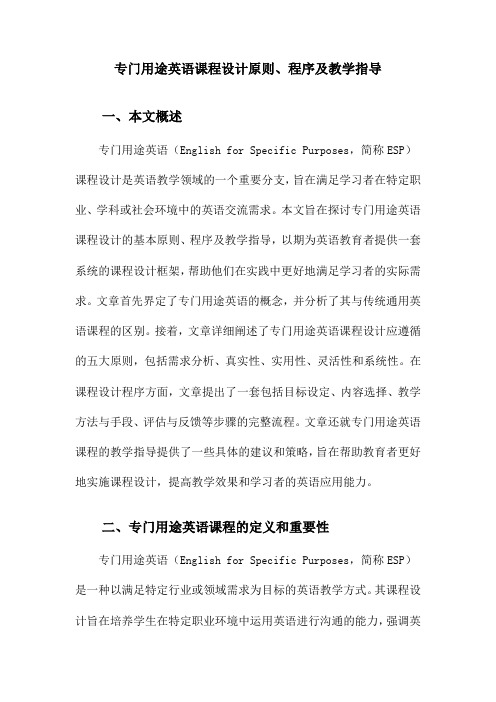
专门用途英语课程设计原则、程序及教学指导一、本文概述专门用途英语(English for Specific Purposes,简称ESP)课程设计是英语教学领域的一个重要分支,旨在满足学习者在特定职业、学科或社会环境中的英语交流需求。
本文旨在探讨专门用途英语课程设计的基本原则、程序及教学指导,以期为英语教育者提供一套系统的课程设计框架,帮助他们在实践中更好地满足学习者的实际需求。
文章首先界定了专门用途英语的概念,并分析了其与传统通用英语课程的区别。
接着,文章详细阐述了专门用途英语课程设计应遵循的五大原则,包括需求分析、真实性、实用性、灵活性和系统性。
在课程设计程序方面,文章提出了一套包括目标设定、内容选择、教学方法与手段、评估与反馈等步骤的完整流程。
文章还就专门用途英语课程的教学指导提供了一些具体的建议和策略,旨在帮助教育者更好地实施课程设计,提高教学效果和学习者的英语应用能力。
二、专门用途英语课程的定义和重要性专门用途英语(English for Specific Purposes,简称ESP)是一种以满足特定行业或领域需求为目标的英语教学方式。
其课程设计旨在培养学生在特定职业环境中运用英语进行沟通的能力,强调英语语言的实用性和功能性。
ESP课程通常涵盖商务英语、医学英语、法律英语、工程英语等多个领域,旨在帮助学生掌握与未来职业相关的专业词汇、语法结构和沟通技巧。
专门用途英语课程的重要性不言而喻。
随着全球化的加速和国际交流的增多,具备专业英语沟通能力已成为许多行业的基本要求。
通过ESP课程的学习,学生可以更好地适应国际化的工作环境,提升职业竞争力。
ESP课程有助于培养学生的自主学习能力,使其在未来的职业生涯中能够持续学习和进步。
ESP课程还能帮助学生拓展国际视野,增强跨文化交流能力,为未来的国际合作和发展奠定基础。
专门用途英语课程设计应遵循一定的原则和程序,确保教学内容与行业需求紧密相连,教学方法能够有效提高学生的专业英语沟通能力。
专门用途英语

专门用途英语的发展和专业英语合作教学李红(重庆大学外国语学院重庆 400044)摘要如何在教学实践中发展专业英语教师的素质和能力是提高专业英语教学的关键。
本文从专门用途英语教学发展的角度着重讨论了专门用途英语教师的素质和能力,作者还论述了在国外发展多年的专门用途英语合作教学的多种形式,并提出适用于我国大学专业英语合作教学的形式。
关键词合作教学;专门用途英语;1.专门用途英语(ESP)的起源及其发展专门用途英语(ESP)起源于二十世纪六十年代的后期。
随着第二次世界大战结束后以美国为首的西方国家科学技术及经济的迅猛发展,英语在世界各国日益频繁的交往中,成为最普及的交流工具。
在这一发展进程中,人们学习英语的目的由单一性向多样性发展,学习英语不再被看成仅仅是获得一种良好的教育,而且还与职业、学业和就业相关的多种需求联系起来。
正是为满足不同学习者的多种学习需求,专门用途英语就应运而生了。
关于专门用途英语的分支有三分法和二分法。
根据Hutchinson和Waters(1987)的观点,专门用途英语可分为科技英语(EST),商贸英语(EBE)和社科英语(ESS);每个分支又可再次分为职业和学术英语两个次分支(见图1)。
Jordan(1997)则将专门用途英语分为职业和学术英语两个大分支,而学术英语又再次分为专门类学术英语(ESAP)和一般类学术英语(EAP)(见图2)。
从以上两中划分法,我们可以看出,三分法的划分主要以学科门类为主线;二分法划分主要以学习者的最终语言使用的目的和语言环境为主线的。
作者简介图1:专门用途英语三分法在论述专门用途英语和普通英语的性质时,Hutchinson和Waters(1987)提出两个重要的观点。
1)“专门用途英语不是教一种‘特殊种类’的英语”(Hutchinson和Waters 1987:18)。
虽然专门用途英语有其特殊的语言特性,但并不存在某种特殊的语言种类。
换言之,不应该认为专门用途英语是有别于普通英语的特种语言,两者之间的共性大于特殊性。
专门用途英语
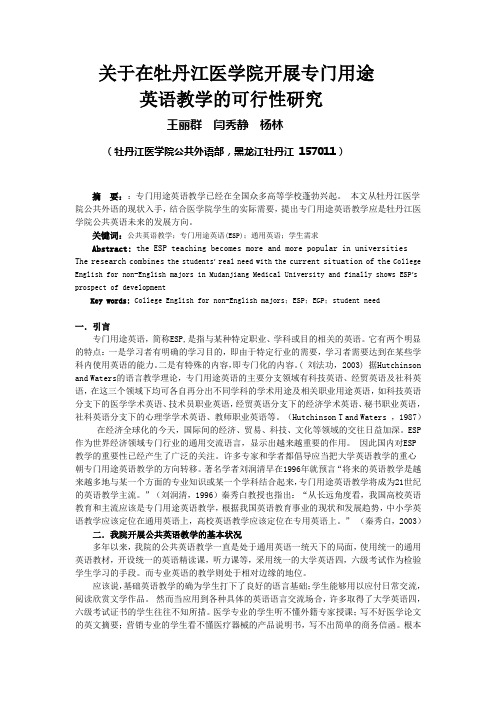
关于在牡丹江医学院开展专门用途英语教学的可行性研究王丽群闫秀静杨林(牡丹江医学院公共外语部,黑龙江牡丹江 157011)摘要::专门用途英语教学已经在全国众多高等学校蓬勃兴起。
本文从牡丹江医学院公共外语的现状入手,结合医学院学生的实际需要,提出专门用途英语教学应是牡丹江医学院公共英语未来的发展方向。
关键词:公共英语教学;专门用途英语(ESP);通用英语;学生需求Abstract: the ESP teaching becomes more and more popular in universities The research combines the students’real need with the current situation of the College English for non-English majors in Mudanjiang Medical University and finally shows ESP’s prospect of developmentKey words: College English for non-English majors;ESP;EGP;student need一.引言专门用途英语,简称ESP,是指与某种特定职业、学科或目的相关的英语。
它有两个明显的特点:一是学习者有明确的学习目的,即由于特定行业的需要,学习者需要达到在某些学科内使用英语的能力。
二是有特殊的内容,即专门化的内容。
( 刘法功, 2003) 据Hutchinson and Waters的语言教学理论,专门用途英语的主要分支领域有科技英语、经贸英语及社科英语,在这三个领域下均可各自再分出不同学科的学术用途及相关职业用途英语,如科技英语分支下的医学学术英语、技术员职业英语,经贸英语分支下的经济学术英语、秘书职业英语,社科英语分支下的心理学学术英语、教师职业英语等。
(Hutchinson T and Waters ,1987)在经济全球化的今天,国际间的经济、贸易、科技、文化等领域的交往日益加深。
[关于,专门,用途,其他论文文档]关于专门用途英语在高职英语教学中的应用
![[关于,专门,用途,其他论文文档]关于专门用途英语在高职英语教学中的应用](https://img.taocdn.com/s3/m/380d5f0d5022aaea988f0f8b.png)
关于专门用途英语在高职英语教学中的应用”论文摘要:专门用途英语(ESP)是一种目标明确、针对性强、使用价值高的教学途径。
E SP方法是一种探索英语与专业相结合的方法体系,能提高英语教学的实用性。
分析了高职英语教学发展改革的趋势,探讨应用ESP来开发出有特色的高职英语课程,改进我国高职英语教学的必要性,从英语课程的目标分析、课程设计、教师队伍和教材建建设的角度来探索ESP在高职英语教学的应用。
论文关键词:专门用途英语;英语教学;ESP方法;应用一、ESP研究综述1964年,系统功能语言学创始人Halliday、 McInfash 和 Strevens 合著出版了《语言科学与语言教学》一书,提出了ESP的概念,首次系统地阐明了根据学习者的具体需要来决定教学内容和方法的原则,标志着应用语言学及语言教学领域里对ESP研究的真正开始。
但是专门用途英语的教学理论和实践从70年代才开始普及,当时的研究主要是在科技英语方面。
此外,在英语教育方面,面向继续深造的学生开设的公共英语课被称为“学术英语”(EAP);而面向毕业后工作的学生开设的课程被称为“职业英语”(EOP)。
到80年代,则是专门用途英语巩固自己“阵地”的时期,这一时期主要关注专门用途英语是否比普通英语课程更有效地促进学生用英语工作或学习。
到90年代,专门用途英语中商务英语发展最快,随之教学重心也转移到这方面来。
ESP(English for Specific Purpose)即“专门用途英语”,是指与某一特定职业或学科相关,根据学习者的学习目的和需求来开设的英语课程。
如:旅游英语、商务英语、财经英语、医学英语等。
ESP是一种目标明确、针对性强、使用价值高的教学途径。
ESP的两个显著特点:一是学习者学习目的是学习特定职业在某些学科内使用英语的技能;二是学习的内容是专门化的内容。
ESP方法是一种探索英语与专业相结合的方法体系,能提高英语教学的实用性。
它以实用为导向,与职业、学业和就业相关的多种需求联系起来,从而提高学生实际运用英语的能力。
高职专门用途英语(ESP)的必要性和意义
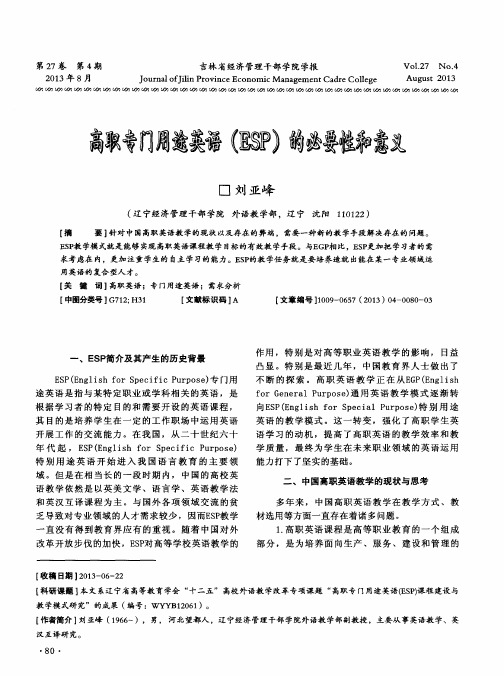
2 0 1 3 年 8月
高 职 专 闸 厕 造 要 性 意
( 辽 宁经济 管理 干部 学院 外语教 学部 ,辽 宁 沈 阳 1 1 0 1 2 2 )
【 摘 要】 针 对 中国 高职 英语教 学的现 状 以及 存在 的弊端 ,需要 一种新 的教 学手段 解决存在 的 问题 。
第2 7卷
第4 期
吉林 省 经济管理干部 学院学报
J o u r n a l o f J i l i n P r o v i n c e E c o n o mi c Ma n a g e me n t C a d r e C o l l e g e
㈣
V o 1 . 2 7 No . 4
特 别 用 途 英 语 开 始 进 入 我 国 语 言 教 育 的 主 要 领 域 。但 是 在 相 当长 的一 段 时期 内, 中 国的高 校 英
语 教 学 依 然 是 以英 美 文 学 、语 言 学 、 英语 教 学 法
和英 汉 互 译 课 程 为主 。 与 国外 各 项 领 域 交流 的贫
乏导 致对 专 业领 域 的 人才 需求 较 少 , 因而E S P 教 学
一
直 没 有 得 到 教 育 界应 有 的重 视 。随 着 中 国对 外
1 . 高职英语课程 是高等职业教育 的一个组成
部 分 ,是 为 培 养 面 向生 产 、 服 务 、建 设 和 管 理 的
改革 开放 步 伐 的加 快 ,E S P 对 高 等 学校 英语 教 学 的
汉互译研 究 。
・
80 ・
高 技 能 的 人 才 的 目标 服 务 的 。 高职 英 语 是 一 门必 修 的 基 础 课 , 不 仅 要 帮 助 学 生 打 好 英 语 语 言 基 础 ,更 要 注 重 培 养 学 生 实 际应 用语 言 的技 能 ,特 别 是 在 未 来职 业 实 践 中运 用 英 语 的技 能 。高 职 英 语 教 学 曾一 度 没 有 明确 的培 养 目标 ,使 用 的教 材
专门用途英语简介演示教学
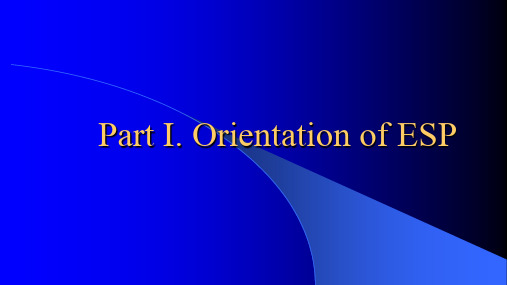
4. Genre is ESP
4. Genre is ESP
Part II. Paragraphs Patterns
—— An illustration of genre
1. The Topic Sentence
Readers want to
1. know righ some idea of how this topic will
Part I. Orientation of ESP
1. What is ESP
ESP is a variation of English that is learnd/taught generally for a clearly utilitarian purpose.
It is unfair for English learners majoring in sciences to acquire English through classic literature works which is the traditional way of learning language. ESP, as part of LSP, is more suitable for them in that it offers them opportunities to learn what they need and spare what they need not.
—— Hutchison & Waters
2. The Taxonomy of ESP
3. The Development of ESP
Register Analysis
Discourse Analysis
Skills and Strategies
专门用途英语英文文献

·Bhatia, V. K. Analyzing Genre: Language Use in Professional Settings[M]. London: Longman Group UK Limited,1993.·Breen, M. P. and Candlin, C. N. The Essential of A Communicative Curriculum in Language Teaching [J]. Applied Linguistics, 1980, 1(2).·Brown, J. D. The Elements Language Curriculum: A Systematic Approach to Program Development [M]. Boston: Heinle & Heinle Publishers, 1995.·Brundage & Mackeracher. Adult Learning Principles and Their Application to Programme Planning [M]. Toronto: Ontario Ministry of Education, 1980. ·Bussmann, H. Routledge Dictionary of Language and Linguistics[M]. Bejing: Foreign Language Teaching and Research Press,2000.·Carter D. Some Propositions about ESP [J]. The ESP Journal, 1983, (2). ·Chomsky, N. A Review of B. F. Skinner’s Verbal Behavior [A]. Readings in the Psychology of Language[C]. Ed. Leon A. Jakobovits and Murray S. Miron. Hertfordshire: Prentice-Hall, 1967.·Chomsky, N. Syntactic Structure [M]. The Hague: Mouton, 1957. ·Cunningsworth, A. Choosing Your Coursebook [M]. London: Heinemann, 1995. ·Dudley-Evans, T. and St. John, M. J. Development in ESP: A Multi-disciplinary Approach [M]. Cambridge: Cambridge University Press, 1998.·Firth, J. R. Papers in Linguistics 1934—1951[M]. London: Oxford University Press, 1957.·Fowler, R. The Structure of Criticism and the Languages of Poetry: An Approach Through Language' [A]. Contemporary Criticism [C]. Ed. Bradbury, M. & Palmer, D. London: Edward Arnold, 1970.·Gardner, R. C. & Lambert, W. E. Attitudes and Motivation in Second Language Learning [M]. Rowley, MA: Newbury House, 1972.·Halliday, M. A. K. Language as Social Semiotic: The Social Interpretation of Language and Meaning[M]. London & Baltimore: Edward Arnold & University Park Press, 1978.·Halliday, M. A. K. & Hasan, R.. Language, Contex, and Text: Aspects of Language in A Social-semiotic Perspective [M]. Victoria: Deakin University Press, 1985. ·Halliday, M. A. K.,McIntosh, A. & Strevens, P. The Linguistic Sciences and Language Teaching [M]. Shanghai: Shanghai Foreign Language Education Press,1964. ·Hatim, B. & Mason, I. Discourse and the Translator [M]. London: Longman, 1990. ·Hilgard, E. Motivation in Learning Theory [A]. Psychology: A Study of Science[C]. Ed. S. Koch. New York: McGraw-Hill Book Company, 1963.·Hirsh, D. & Nation, P. What Vocabulary Size Is Needed to Read Unsimplified Texts for Pleasure? [J]. Reading in a Foreign Language, 1992, (8).·Hutchinson, T. & Waters, A. English for Specific Purposes: A Learning-centered Approach [M]. Cambridge: Cambridge University Press, 1987.·Hymes, D. The Foundations of Sociolinguistics: Sociolinguistics Ethnography[M]. Philadelphia: University of Pennsylvania Press, 1974.·Jordan, R. R. English for Academic Purposes: A Guide and Resource Book for Teachers [M]. Cambridge: Cambridge University Press, 1997.·Krashen, S. Principles and Practice in Second Language Acquisitions[M]. Oxford:Pergamon, 1982.·Malinowski, B. Coral Garden and Their Magic [M]. London: Routledge, 1935. ·McDonough, J. & C. Shaw. Materials and Methods in ELT [M]. London: Blackwell, 1993.·Munby, J. Communicative Syllabus Design[M]. Cambridge: Cambridge University Press, 1978.·Nunan, D. The Learner-centered Curriculum [M]. Cambridge: Cambridge University Press, 1988.·Richards, J. C. & Rogers, T. S. Approaches and Methods in Language Teaching(Second Edition) [M]. Cambridge: Cambridge University Press, 2001.·Robinson, P. ESP Today: A Practitioner’s Guide[M]. New York & London: Prentice Hall International(UK) Ltd., 1991.·Stern, H. H. Fundamental Concepts of Language Teaching[M]. Oxford: Oxford University Press, 1983.·Strevens, P. New Orientations in the Teaching of English [M]. Oxford: Oxford University Press,1977.·Swales, J. Genre Analysis: English in Academic and Research Settings[M]. Cambridge: Cambridge University Press, 1990.·Widdowson, H. G. Teaching Language as Communication[M]. Oxford: Oxford University Press, 1978.。
浅析专门用途英语(ESP)应用于高职公共英语教学中的重要性
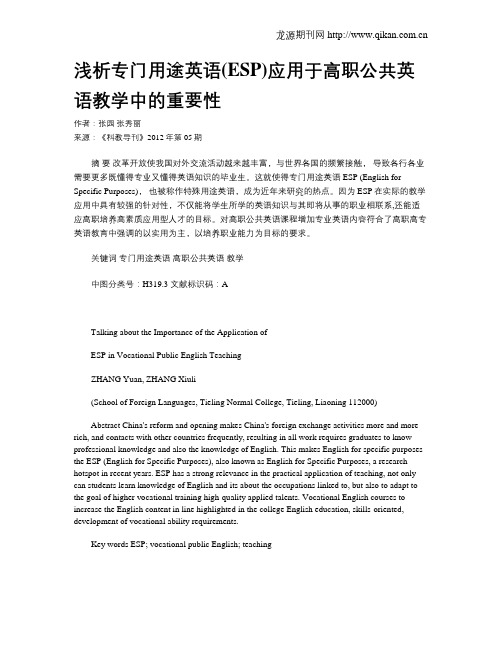
浅析专门用途英语(ESP)应用于高职公共英语教学中的重要性作者:张园张秀丽来源:《科教导刊》2012年第05期摘要改革开放使我国对外交流活动越来越丰富,与世界各国的频繁接触,导致各行各业需要更多既懂得专业又懂得英语知识的毕业生。
这就使得专门用途英语ESP (English for Specific Purposes),也被称作特殊用途英语,成为近年来研究的热点。
因为ESP在实际的教学应用中具有较强的针对性,不仅能将学生所学的英语知识与其即将从事的职业相联系,还能适应高职培养高素质应用型人才的目标。
对高职公共英语课程增加专业英语内容符合了高职高专英语教育中强调的以实用为主,以培养职业能力为目标的要求。
关键词专门用途英语高职公共英语教学中图分类号:H319.3 文献标识码:ATalking about the Importance of the Application ofESP in Vocational Public English TeachingZHANG Yuan, ZHANG Xiuli(School of Foreign Languages, Tieling Normal College, Tieling, Liaoning 112000)Abstract China's reform and opening makes China's foreign exchange activities more and more rich, and contacts with other countries frequently, resulting in all work requires graduates to know professional knowledge and also the knowledge of English. This makes English for specific purposes the ESP (English for Specific Purposes), also known as English for Specific Purposes, a research hotspot in recent years. ESP has a strong relevance in the practical application of teaching, not only can students learn knowledge of English and its about the occupations linked to, but also to adapt to the goal of higher vocational training high-quality applied talents. Vocational English courses to increase the English content in line highlighted in the college English education, skills-oriented, development of vocational ability requirements.Key words ESP; vocational public English; teaching1 高职公共英语教学中急需引入专业用途英语教学中国加入世贸组织,各个领域里的国际交流也极大扩展,使英语在各行各业中发挥了越来越重要的作用。
英语说明物品的用途作文

英语说明物品的用途作文Title: The Use of Everyday Items。
Introduction。
Everyday items are objects that we use in our daily lives to make tasks easier and more efficient. These items serve a variety of purposes, from cooking and cleaning to organizing and communicating. In this essay, we will explore the different uses of some common everyday items and how they contribute to our daily routines.Kitchen Items。
In the kitchen, we use a variety of items to prepare and cook our meals. For example, a knife is used forcutting fruits, vegetables, and meat, while a cutting board provides a stable surface for chopping. Pots and pans are used for cooking food on the stove, and a spatula is used for flipping and stirring. Additionally, a colander is usedfor draining pasta and washing vegetables, while a whisk is used for mixing ingredients together. These kitchen items are essential for preparing delicious meals and keeping our kitchens organized.Cleaning Items。
应用英语的工作总结报告
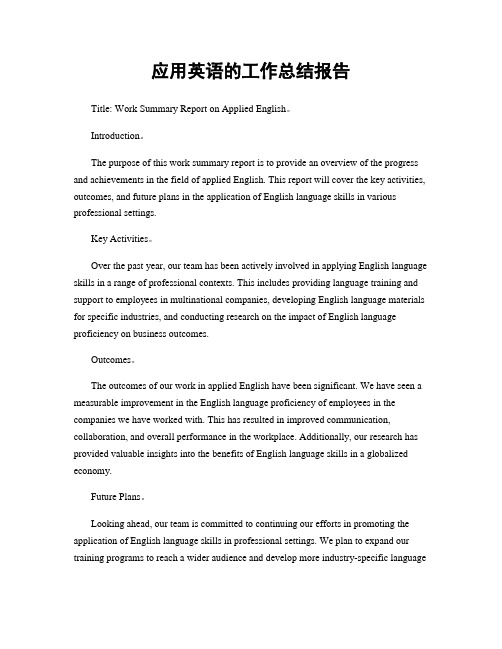
应用英语的工作总结报告Title: Work Summary Report on Applied English。
Introduction。
The purpose of this work summary report is to provide an overview of the progress and achievements in the field of applied English. This report will cover the key activities, outcomes, and future plans in the application of English language skills in various professional settings.Key Activities。
Over the past year, our team has been actively involved in applying English language skills in a range of professional contexts. This includes providing language training and support to employees in multinational companies, developing English language materials for specific industries, and conducting research on the impact of English language proficiency on business outcomes.Outcomes。
The outcomes of our work in applied English have been significant. We have seen a measurable improvement in the English language proficiency of employees in the companies we have worked with. This has resulted in improved communication, collaboration, and overall performance in the workplace. Additionally, our research has provided valuable insights into the benefits of English language skills in a globalized economy.Future Plans。
应用英语的工作总结报告

应用英语的工作总结报告Title: Summary Report on Applied English Work。
Introduction:This report aims to provide a comprehensive summary of the work conducted in the field of applied English. It will cover the various tasks and projects undertaken, as well as the outcomes and impact of the work.Work Undertaken:Over the past year, the applied English team has been involved in a range of activities, including language training, translation services, and content creation. We have provided English language courses to employees, enabling them to improve their communication skills and enhance their job performance. Additionally, we have offered translation services for documents, presentations, and other materials, ensuring that language barriers are overcome and information is effectively communicated. Moreover, our team has been instrumental in creating engaging and informative content in English, which has been used for marketing, training, and internal communication purposes.Outcomes and Impact:The work conducted by the applied English team has yielded positive outcomes and made a significant impact on the organization. Employees who have participated in our language training programs have reported feeling more confident in their ability to communicate in English, leading to improved collaboration and productivity. The translation services provided have enabled the organization to reach a wider audience and effectively convey its message to non-English speakers. Furthermore, the content created by our team has been well-received, contributing to the overall success of various initiatives and projects.Challenges and Opportunities:Throughout the year, the applied English team has faced several challenges, such as tight deadlines, complex translation projects, and the need to continuously update and improve language training materials. However, these challenges have also presented opportunities for growth and development. By overcoming these obstacles, the team has strengthened its capabilities and gained valuable experience in managing diverse linguistic and communication requirements.Recommendations:In light of the work conducted and the challenges faced, it is recommended that the organization continues to invest in and support the efforts of the applied English team. This may involve providing additional resources, such as language training tools and technology, as well as recognizing the importance of effective communication in achieving organizational goals.Conclusion:In conclusion, the work of the applied English team has been instrumental in facilitating effective communication and language support within the organization. The outcomes and impact of our work have been positive, and we are committed to continuing to deliver high-quality services in the future. We look forward to further contributing to the organization's success through our expertise in applied English.。
专门用途英语课程系列:大学学术英语视听说教程上

专门用途英语课程系列:大学学术英语视听说教程上-CAL-FENGHAI.-(YICAI)-Company One1专门用途英语课程系列:大学学术英语视听说教程上Unit 1 Belonging to a GroupChapter 1The Marriage, Family, and the Home•Reading and thinking about the topicB. Answer the questions1、Increased industrialization, greater geographical mobility, higher divorce rates and greater equality for women are among the changes that have affected family structure over the past century.2、In the extended family, many generations live in the same household. In the nuclear family, two married adults live together with their children3、Alternative family structures include single-parent families, couples living together without getting married, divorced couples who remarry, and blended families.•Listening for factual informationA. Fill in the chart1、Egypt2、Niger3、South Africa4、Argentina5、Canada6、the United States7、China8、Japan9、France10、SpainB. Listen and fill in the chart18 29 27 27 31 18 16 34 35 27 32 30 34 33•Interview 1 -The Stress of Teaching First-Graders Examining vocabulary in context:1、compared to most people2、food prepared at home3、stop fighting4、hardly5、customs6、origins7、protection, a place to live8、competition between brothers and sisters9、telling others what to do10、give up and cooperateListening for details:1、C2、B3、B4、C5、B6、B7、C8、A•Interview 2- Family StoriesExamining vocabulary in context:1、entertained, kept her from paying attention to something2、laughing in an uncontrolled way3、defrost4、really funny5、object that belongs to the family6、distinctive, different7、worth a lot of money8、an object that remains in the family for many years9、a family member with a bad reputationResponding to questions:1、Thanksgivinga big dinner2、plastic packaging3、make them throw the turkey out4、froze5、a bow6、unique and beautifula baby7、pass it on to her children in the future8、uncle9、had a big disagreement with them Listening for stressed words:Expert 1ACExpert 2ACExpert 3BCExpert 4ACExpert 5BC•Before the LectureMain ideas and supporting details:•Lecture Part 1-Lecture Part 1 Rewards and Punishments Guessing vocabulary from context:1-5: iacjf6-10: gdbheOrganizing your notes in columns:Main Idea 1·family – the most basic unit of social structure ·how families are changing·nontraditional families: good or bad effect on children Main Idea 2·punishmentsMain Idea 3·eat vegetables – then ice cream·Children get gifts for good behavior.Main Idea 4·second important way in which children are socialized·Parents don’t let children watch TV if they get bad grades.Main Idea 5·Hitting on hand/spanking doesn’t teach children anything.•Lecture Part 2 -ModelingGuessing vocabulary from context:1、f2、d3、e4、b5、a6、g7、cOrganizing your notes in columns:Main Idea 6·learning to behave by following an exampleMain Idea 7·First role models are often parents·Peter likes to study because his mother studies with him.Main Idea 8·do as I tell you·Studies: If you smoke, probably ineffective to tell a child not to smoke.Main Idea 9·family members, friendsMain Idea 10·from TV: 80% of programs contain violent behaviorMain Idea 11·grow up in environment with fair rules that are followedChapter 2The Power of the Group•Reading and thinking about the topicB. Answer the questions:1、People can belong to different groups: families, friends, groups at work, at school, and in religious settings, and societies and nations.2、Peer pressure is pressure put on others of the same age or in the same situation.3、The groups we belong to may influence our opinions, interactions, and decisions.•Getting StartedListening for specific information/B:1、wouldwould not2、wouldwould3、wouldwould not4、would notwould not5、wouldwould not•Before the InterviewsBefore the Interviews:a、go along with the crowdb、jumping on the bandwagonc、Two heads are better than one.d、there’s no “I” in teame、Don’t be a backseat driver.f、you’re all in the same boat •Interview 1 -Living with Teenagers Examining vocabulary in context:1、move or change2、becomes fully developed3、with a quick look4、a new fashion that is suddenly popular5、watch it carefully6、place a limit on what is permitted7、intimidated, frightened by others8、groups of friends with shared interests9、people who copy others’ behaviorListening for main ideas:23478•Interview 2- Expressions about GroupsExamining vocabulary in context:1、student studying for an advanced degree, like an MA2、stress, focus on the importance of3、a person specializing in languages4、people who are similar do similar things together5、spend time with6、acting in the same way as other people7、large numbers of people went to the concert8、suggestsListening for specific information:1、A2、B3、B4、A5、A6、B7、BListening for tone of voice:1、joking2、serious3、joking4、serious5、joking•Before the LectureOrganizational phrases:a、7b、2c、4d、1e、8f、3g、5h、6•Lecture Part 1 -Reasons for Culture ShockGuessing vocabulary from context:1、surroundings2、articulated3、immense4、stressful5、complex6、irrationally7、govern8、manifestation9、phenomenonOrganizing your notes in outline form:II:1、Reasons why people experience culture shock2、Different stages of culture shockIII:B、governed by other rulesC:1、irrationally2、shocked and out of control•Lecture Part 2- Stages of Culture Shock Guessing vocabulary from context:1、d2、h3、a4、g5、c6、i7、f8、e9、bUsing a lecturer’s diagrams and charts: Stage 1HoneymoonEmotions:euphoriaexcitementStage 2LetdownEmotions:lonelinessconfusionStage 3ResignationEmotions:adjustment•Unit 1 Academic Vocabulary Review Academic Vocabulary Review:1、acquireacquired2、alternativeAlternatively3、benefitsbeneficial4、clarifiedclarificationclarify5、concentrationconcentrate6、conflictconflicting7、Conformingconform8、consequenceConsequently9、controversycontroversial10、cooperatescooperativeCooperation11、distinctdistinctions12、emphaticemphasized13、generationalgeneration14、interactiveinteract15、reactreactionUnit 2Unit 2 Gender in SocietyChapter 3Gender Roles•Reading and thinking about the topicB. Answer the questions:1、Gender roles are the socially learned patterns of behavior that distinguish boys from girls and men from women.2、The “nature/nurture”debate is about whether people’s behavior is inherited (innate) or learned (acquired).3、Boys and girls in many countries have more freedom today than in the past to explore their individuality, and less pressure to conform to traditional gender roles.•Getting StartedBuilding background knowledge:1、independent, strong-willed, adventurous, athleticgreat2、timid, sensitivegoodchildrenboys3、gentle, sweet, helpless, vulnerable.aggressive, bad, brave, strongstereotypes•Interview 1 -Bringing Up ChildrenExamining vocabulary in context:1、bring up2、period of time3、vaccination4、made to experience5、important problem6、do extremely well7、feeling of closeness and friendship8、make fun of / in a rough way Answering multiple-choice questions:1、C2、B3、C4、A5、C6、A7、B8、A•Interview 2-Growing Up as a Boy or Girl Examining vocabulary in context:1、brothers and sisters2、deadline for returning home3、protect, sometimes too much4、emotionally encouraging5、felt unhappy and angry6、without raising any objections7、take care of, protect from danger Listening for specific information:Joy:2DifferentlySharon:0Not applicableDavid:1The samePeter:1DifferentlyListening for opinions:B•Before the LectureBuilding background knowledge:1、Coeducational refers to boys and girls being taught in the same classroom, as opposed to single-sex (also called single-gender) education.2、According to the passage, boys often get more attention from teachers and are given more demanding academic challenges than girls in coeducational schools. In contrast, girls are encouraged to be quiet and well behaved.Using symbols and abbreviations/A:1-5: cjlia6-10: mkfnb11-14: dghe•Lecture Part 1- Pros and Cons of Single-Gender Education for Girls Guessing vocabulary from context:1、g2、a3、f4、h5、b6、d7、e8、i9、cUsing symbols and abbreviations:Cons:·♂/♀ can’t dev. ability to interact/be comfortable/compete ·no smooth transition into adult ♂/♀ worldPros:·values ♀’s unique quals.·♂/♀ can’t dev. ability to interact/be comfortable/compete•Lecture Part 2 -Two Main Benefits of All-Girls’ Schools Guessing vocabulary from context:(1)distractions(2)confident(3)collaborative(4)self-esteem(5)respect(6)emotionally(7)abstract(8)support(9)clarificationUsing your notes to make an outline:I:A:abstract thinking 4 yrs. earlier than boysC:collaborative learning activitiesII:B:collaborative learning activitiesIII:A:have been doing well in school•C:become more confident and make positive changes Chapter 4Gender Issues Today•Reading and thinking about the topicB. Answer the questions:1、The women’s movement began in the eighteenth century.2、In the twentieth century, people began to be encouraged to choose careers they were interested in. At home, husbands and wives began to share household chores more.3、Not all women have benefited from this progress.•Getting StartedListening for specific information:Situations:1、work harderhave a baby and leave her job2、loves his familyis more interested in her husband and children than she is in her career3、discussing something importantjust chatting4、think the trip will be good for his careerwonder what her husband will think•Before the InterviewsBuilding background knowledgea、Mommy trackb、Old boys’ clubc、Level playing fieldd、Glass escalatore、Glass ceilingf、Sticky floorg、To get a foot in the door•Interview 1 -Gender Discrimination in the Workplace Examining vocabulary in context:1、deep and immediate2、terrible, bad3、feelings that are in conflict with each other4、finding reasons not to feel bad about myself5、usuallyAnswering multiple-choice questions:1、C2、B3、C4、B•Interview 2- Gender Inequality at Home and in the Workplace Examining vocabulary in context:1、difference in pay2、not very large or important3、co-workers4、chief executive officer — one of the most important positions in a company5、a feeling that they deserve the best opportunities6、legal responsibility for a child7、feel that they can do it even though they haven’t done it before8、a group of mothers and/or fathers that meets so that their children can play together9、a parent who is physically involved in caring for his or her childrenAnswering true/false questions:1、F2、F3、T4、F5、F6、T7、TListening for tone of voice:1、A2、B3、B4、B5、C•Before the LectureBuilding background knowledge:1、A gender-specific term can show sexism. Chairman is one example.2、A gender-neutral term avoids sexism. Chair and chairperson are examples.3、It is difficult to be gender-neutral when using pronouns because there is no gender-neutral singular pronoun in English.4、The pronouns imply that the doctor, secretary and shopper are all male.Using telegraphic language:a、3b、4c、1d、2•Lecture Part 1-Gender-Specific and Gender-Neutral LanguageGuessing vocabulary from context:1、B2、A3、B4、B5、C6、C7、B8、AUsing telegraphic language:I:Sexism in lang. & how to avoid itII:Terms that refer to menIII:Gen-neutralIV:Grammar — problemMany univ. profs/writers prob do same •Lecture Part 2-Questions and Answers Guessing vocabulary from context:1、a2、f3、e4、c5、b6、g7、dUsing telegraphic language:1、international organizationswordsideaschildren’s literaturewomen2、doeschairmanmenauthority3、more and morelanguagegender issues•Unit 2 Academic Vocabulary Review Academic Vocabulary Review:1、inaccurateAccuracy2、adjustingadjustment3、adulthood4、availabilityunavailable5、unawareawareness6、bondingbond7、challengechallenging8、communication9、discriminationdiscriminate10、expertise11、individualindividualistic12、intelligenceunintelligent13、similarsimilarities14、Traditionallytraditional15、InvisibleUnit 3 Media and SocietyChapter 5Mass Media Today•Reading and thinking about the topicB. Answer the questions:1、The modern world is connected by all kinds of media, such as the radio, television, newspapers, and the Internet.2、It communicates information, entertains us, explains, informs, describes, and educates us.3、Some people believe that information is not always accurate. It may also bebiased or incomplete.Getting StartedListening for specific information:1、A2、B3、A4、B5、A•Interview 1 -Problems with TV NewsExamining vocabulary in context:1、watching TV2、medical surgery to improve your physical appearance/famous people3、trick, play with4、without serious meaning5、speaking “off-camera” about what the viewer is watching6、immediate satisfaction7、reporting8、tricked into watchingAnswering multiple-choice questions:1、C2、B3、A5、B6、C7、B•Interview 2- Opinions About the News Examining vocabulary in context:1、natural catastrophe, serious problem2、surrounded against our wishes3、the latest information4、really believe5、after it happens6、photographers who take pictures of celebrities7、unwelcome attention into private matters Listening for main ideas:1、BC2、AB3、B4、ABListening for stressed words:1、A2、B3、B•Before the LectureListening for signal words: OccasionallyTo begin withActuallyThese daysButGenerally1、Nowadays2、In fact3、First of all4、Sometimes5、Usually6、However•Lecture Part 1- The Work of a Journalist Guessing vocabulary from context:1、c2、b3、d4、i5、e6、g7、f8、h9、a•Lecture Part 2 -Getting a Story into PrintGuessing vocabulary from context:1、b2、e3、a4、d5、c6、fChapter 6Impact of the Media on Our Lives•Reading and thinking about the topicB. Answer the questions:1、People disagree about the effects of the media on society.2、The media allows us to interact with others, participate in world events, connect with friends and strangers, and keep informed. However, not everyone has equal access to the Internet. The media also invades our privacy and may make us passive, violent, or materialistic. They also cause us to waste time.•Getting StartedRecording numerical information:•Interview 1 -The Advantages of the Media Examining vocabulary in context:1、firmly established2、area/entered3、grown in importance4、critically important5、feeling of affection for the past6、biased, inaccurate7、traditions, beliefs and values Listening for specific information:1、islittlemedia2、conveniencesending a lettersending an email3、photos and videos4、don’t exist5、luckyhas•Interview 2-Disadvantages of the MediaExamining vocabulary in context:1、forced to accept different views, not allowed to think for ourselves2、prevents us from using well3、available to you4、disadvantages5、communicate6、with a high level of industrial development / with a low level of industrial development7、uniform, the same for everyoneListening for specific information:1、antisocialreading2、cell phoneinternational communication3、the developing worldthe United StatesListening for tone of voice:1、B2、C3、A4、B•Before the LectureOrganizing your notes as a map:•Lecture Part 1 -Violence, Passivity, and AddictionGuessing vocabulary from context:1、g2、a3、b4、e5、c6、f7、h8、dOrganizing your notes as a map:1、susceptible to violenceboy jumped out of window like superhero on TV2、we may make bad decisions because we can’t tell dff. btwn. fantasy & reality3、time wasted on Internet always checking e-mail•Lecture Part 2-Advertising and Invasion of PrivacyGuessing vocabulary from context:1、a2、f3、d4、h5、b6、g7、c8、e•Unit 3 Academic Vocabulary Review Academic Vocabulary Review:1、V,N2、N3、V4、N5、N,V6、V7、A8、N,A9、A10、N11、A12、V13、V14、V,A15、N16、N1. Celebrity wedding plans revealed Accessrestrictedselectedrequired2. Cholesterol levels rising Consumersperspectiveoverallrelevant3. New smartphone releasedSurveysInnovationmanipulatedobjective4. Bees disappearing across the globe issuetheoriesnegativecontradictingUnit 4Unit 4 Breaking the RulesChapter 7Crime and Criminals•Reading and thinking about the topicB. Answer the questions:1、Deviant behavior is unacceptable to society, but not all deviant behaviors are criminal. A crime is an illegal deviant behavior.2、Two main categories of crime are felonies and misdemeanors. Other crime categories include white-collar crimes, blue-collar crimes, “crimes of passion,”and “modern”crimes that have been made possible by technology, such as cyber crime.3、It is difficult to know how many crimes are committed because not all crimes are reported and not all criminals are caught.•Getting StartedBuilding background knowledge:5 167 3 4 2•Interview 1 -Crime in Society TodayExamining vocabulary in context:1、personally affected2、walking around with no clear purpose3、noisy, wild4、even less, certainly haven’t5、without any definite pattern6、small metal object fired from a gun7、situation that will lead to serious trouble8、groups of young people who are involved in antisocial or illegal activities9、lazy, not interestedAnswering true/false questions:1、T2、F3、F4、F5、T6、F7、F8、T•Interview 2-Being the Victim of a CrimeExamining vocabulary in context:1、attacked and robbed2、being charged with a crime and taken to court3、easily influenced4、strong and manly5、broken into, searched, and left in a messy condition6、something you can never get again7、invasion8、thieves who steal things out of pockets or bags, especially in crowds9、emotionalListening for details:1、A2、AB3、BC4、B5、ABC6、BC7、AB8、A9、BCListening for tone of voice:serious, thankfulthoughtful, surprisedsad,angryangry, resigned•Before the LectureOrganizing vocabulary: Technical terms:Categories of crime:misdemeanorwhite-collar crimeblue-collar crimeTypes of crime:fare evasionpickpocketingkidnappingMethods of solving crime:crime hotlinefingerprintingpsychological profilingPeople who commit crime or are involved in punishing crime: juryDefendantClarifying your notes:misdemeanors15judge•Lecture Part 1-Types of CrimeGuessing vocabulary from context:1、h2、g3、b4、f5、e6、d7、a8、c•Lecture Part 2 -Ways of Solving Crime Guessing vocabulary from context:1、A2、C3、B4、C5、A6、C7、CUsing your notes to answer test questions: 1、questioningestablish many basic facts2、adraidpubliclya family member3、unique4、the waypersonality and motivation5、privacy6、99%Chapter 8Controlling Crime•Reading and thinking about the topicB. Answer the questions:1、One approach is to stop crime from happening in the first place; another is to punish it more harshly.2、Educational and social programs could discourage young people from committing crimes.•Getting StartedListening for opinions:1、A2、B3、A4、B5、A6、B•Interview 1 -Preventing Juvenile CrimeExamining vocabulary in context:1、makes worse2、machines that can detect guns, knives, and other weapons made of metal3、physically examined4、with one other person5、become ineffective6、organized7、money8、stronger, more serious9、punishmentListening for main ideas:1、mediaschool system2、security guardsentrancessearched3、don’tjailwrong4、security guards5、instructionalathletic6、doesbetter•Interview 2- The Prison ExperienceExamining vocabulary in context:1、people who commit a crime for the first time2、stopping people from committing crime3、taught how to have a socially acceptable way of life4、most important people5、cruel and severe6、programs that help released prisoners adjust to society7、repeat criminals8、disrespectful, critical9、shameListening for main ideas:While a convicted criminal is in prisonrehabilitationeducationaldrug treatmentpsychologicalcutAfter a person is released from prisonBridge programshousing and jobsvery viewListening for contrasting ideas:2、B3、B4、B•Before the LectureRecording numerical information:1、19722、19763、over a thousand4、675、2/36、97、8、•Lecture Part 1-Arguments Against the Death Penalty Guessing vocabulary from context:1、A2、B3、B4、C5、B6、C8、C•Lecture Part 2-Questions, Answers, and Comments Guessing vocabulary from context:1、g2、e3、h4、b5、c6、d7、f8、a•After the LectureSummarizing what you have heard: controversialdeterhomicidepoor malesAfrican Americansmake mistakesto be punished50,000 executions•Unit 4 Academic Vocabulary Review Academic Vocabulary Review1-5: hgfeb6-10: dcalm11-15: konij1、investigateddemonstratecommitting2、accuratesecurityrandomoccur3、statisticsidentifiedpositiveeliminate4、detectiveillegalmotiveresearch。
